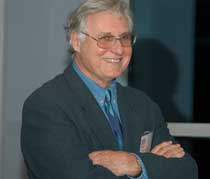“Confronting Death: College Students on the Community of Mortals”
 KINGSTON, R.I. – Dec. 30, 2013 – Death. It’s the only certainty in life, yet most avoid talking about the subject. It’s simply too frightening to ponder.
KINGSTON, R.I. – Dec. 30, 2013 – Death. It’s the only certainty in life, yet most avoid talking about the subject. It’s simply too frightening to ponder.
Now a new collection of essays by University of Rhode Island political science graduates brings death into the open and shows how mortality can unify people in today’s troubled times.
“Confronting Death: College Students on the Community of Mortals,” is a collection of 18 essays that explore how death can transform people and societies. The co-editor is Alfred G. Killilea, professor emeritus of political science at URI.
Killilea, of Kingston, says the book is the result of essays he asked his students to submit for “The Politics of Being Mortal,” a seminar he’s been teaching for years about society’s shifting views on death. As American politics withers from deep ideological divisions, Killilea says our mortality is a strong force for finding common ground.
“At a time when our world seems to lack the moral and political will to confront enormous challenges to our planet and our very survival, confronting our common mortality may provide us with a powerful fulcrum for change,” Killilea says. “Enmities and enemies look a lot different when we are cognizant of the fact that we all will die.”
Some essays are strictly political, such as the ones about jihadist martyrs, child soldiers and the Nazis, who monstrously decided who was a human being – and who was not. Two essays examine suicide, including a well-trodden “suicide forest” on Mount Fuji in Japan, where “nature guards” patrol the woods searching for people considering suicide; another essay considers capital punishment from the perspective of a prison chaplain.
Other essays explore death themes in the work of writers Kurt Vonnegut and Christopher Hitchens, who wrote searing articles about facing mortality as he battled esophageal cancer. He died of the illness in 2011. “I’ve often felt a sense of comfort that my life is finite, despite my fears associated with the actual death,” writes contributor Danielle Dirocco in her piece about Hitchens. “While many are threatened that we are merely a speck for barely a moment in time in the vastness of the universe, I find this fact to be awe-inspiring. I am proud that I am but one tiny element that makes up this amazing universe.”
One essay looks at the evolution of the grim reaper from its origins in the black plague of the 14th century to its portrayal in Bill and Ted’s Bogus Journey. Finally, one essay considers street gangs’ attitude toward death, and another piece argues that climbing Mount Everest is a life-affirming experience, not a death wish.
“Kirkus” praised the essays, calling them lively and fascinating, despite the grim subject. The literary magazine singled out several essays, including Ashley Stoehr’s piece examining Jane Goodall’s research on chimpanzees. Her conclusion: death is “nature’s ultimate equalizer.”
Dylan Lynch, the book’s other co-editor, also gets a nod in his essay about Vonnegut for pointing out that most people spend their days denying death, but are still crippled by the always-present fear of death. The book’s message is that everything comes and goes, and that acceptance of death is key to living a rewarding life.
A positive review also appeared in the literary magazine “Clarion.” “That eighteen college students can write with such depth about community and mortality is impressive,” the reviewer says. “This will definitely be a conversation starter.”
Here are the contributors:
Alfred Killilea received his bachelor’s degree from the University of Notre Dame and his doctorate from the University of Chicago. He is the author of “The Politics of Being Mortal” and is co-editor of “Ethical Dilemmas in Public Administration.”
Max Cantor ’11, of New York City, is a student at the New York University School of Law.
Alexander Colantonio ’11, ’13 (M.A.), lives in Smithfield.
Ilana Coenen ’13 lives in Providence.
Danielle Dirocco ’09, ’13 (M.A.), of Narragansett, heads the graduate student union at URI.
Margaret Frost ’11, of South Kingstown, works for the United Nations in Geneva, Switzerland.
Liana Goff ’11, of Fairfield, Conn., works on civil rights in New York City.
Andrew Karanikolis ’10 lives in Wakefield.
Dylan Lynch ’10, ’12 (M.A.), of Pawtucket, is a law student at Tulane University.
Dan Magill ’12, of Portsmouth, is a graduate student in cyber forensics at URI.
Tess O’Keefe ’11 is from South Kingstown and lives in Boston.
Samantha Pettey ’11 (M.A.), is a doctoral candidate at the University of North Texas, focusing on American politics and research methodology.
Eli Roth ’11, of South Kingstown, works with at-risk youth in Boston.
Ashley Stoehr ’11 is pursuing her doctorate in fish physiology at the University of Massachusetts at Dartmouth.
Shelby Sullivan-Bennis ’11 lives in New York City and is a student at City University of New York School of Law.
Elizabeth Toppi ’11 is from Smithfield.
Christopher Turco ’11 lives in Boston and is a student at New England School of Law.
Morgan Zubof ’13 (M.A.), lives in Jamestown.
Pete Zubof ’13 (M.A.), lives in Jamestown and serves as an officer and a pilot in the U.S. Navy.
To buy the book, please visit the book’s website at http://www.confrontingdeath.com. The book is also available on amazon.com.
Photo above: Alfred G. Killilea, professor emeritus of political science at the University of Rhode Island. Photo by Nora Lewis

